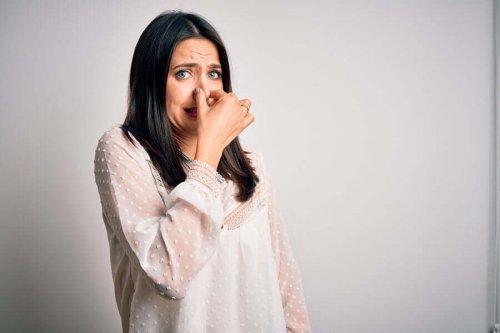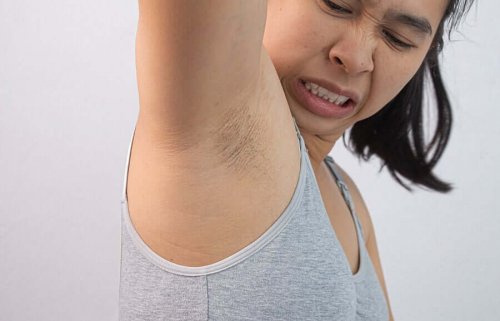Dermatitis Neglecta - When You Don't Shower


Written and verified by the doctor Leonardo Biolatto
What happens in our body when we don’t shower is rather uncanny. The stories about how bad odor and skin infections are the results of a lack of hygiene are true. In fact, science has studied these effects and even identified a pathology known as dermatitis neglecta.
You may not know it but the skin is constantly colonized by microorganisms. This microbiota, present in the epidermis, is comprised of bacteria and fungi. There are various types of bacteria and they vary with the climate and the age of a person.
The skin microbiota fulfills different functions and body hygiene plays a big role in the process of maintaining it. What happens in our body when we don’t shower is that we stop intervening positively in the growth of bacteria and fungi. Thus, we give it an opportunity for uncontrolled reproduction.
The lack of showers and baths makes it easier for bacteria to multiply and the body begins to assimilate pathogenic microorganisms that no longer fulfill healthy functions in the body. In short, we become more susceptible to external bacteria and fungi.
Dermatitis neglecta happens when we don’t shower
Our body changes when we don’t bathe for several days. Even though some of these changes are internal, such as a change in metabolism, most are external. They concentrate on the skin. Among these changes, we have:
- Slow metabolism. Showers and baths stimulate internal cellular processes. Thus, metabolic rate increases with hygiene because it receives a stimulus to generate energy. On the contrary, without proper hygiene, the energy generation processes retract.
- Accumulation of dead tissue. Washing removes the dead cells of the epidermis so that new cells take their place. This also reduces sebum production so it particularly impacts people with acne.
- Dermal infections. As you can imagine, what happens in our body when we don’t shower is that it promotes the implantation of pathogenic microorganisms. Dermatitis neglecta is a clinical form we’ll review later.
- Bad smell. The skin begins to smell bad when we don’t bathe regularly. And although the cause of the unpleasant odor is usually attributed to sweat, this isn’t the actual source. Lack of showers generates the implantation of bacteria that aren’t part of the normal skin microbiota. Thus, bacteria accumulate and the skin stores rotting dead cell debris. This is where the smell comes from.

Keep reading: Tips for Eliminating Smelly Armpits
Dermatitis neglecta
Relatively recently, in 1987, researchers described this pathology. So, it’s not a new disease, and researchers are continuing to do studies on this condition.
Dermatitis neglecta occurs in our body when we don’t bathe frequently. It manifests as scaly skin. These scales are textured and have a high concentration of sebum. The primary cause here is poor hygiene.
Poor hygiene doesn’t always have to do with laziness or lack of interest in one’s personal appearance. For instance, when it comes to mentally ill people, these people don’t groom as a consequence of their mental condition. There are also local forms of this condition, often around surgical scars that aren’t sanitized because it would be painful.
Another clinical condition that people often mistake for Dermatitis neglecta is terra firma-forme dermatitis. The main difference is the age of onset since teenagers are most affected by the latter. These are teens who neglect their hygiene due to the behavioral changes typical of this stage of life. These, of course, include typical poor hygiene habits.
Scales are the only symptom of dermatitis neglecta. The bad smell accompanies injuries due to the accumulation of cellular debris and the bacteria that proliferate there. Washing is the only treatment and the condition doesn’t require antibiotics.

Find out more: Eleven Home Remedies for Smelly Armpits
It isn’t healthy to wash too often either
What happens in our body when we don’t shower is harmful, but doing so excessively can also backfire. Balance is the best measure.
This is because excessive showering leads to dermatitis. There may be excess peeling and therefore a loss of cells that are important for the protection of the epidermis.
In addition, we usually use chemicals such as soaps, gels, and shampoos when we shower and this also leads to certain outcomes. The skin could react to such compounds, and there could be adverse side effects.
Conclusion
What happens in our body when we don’t shower is a series of skin reactions. More than three days without showering can be harmful due to the alteration of the microbiota, leading to the production of bad odor.
Similarly, don’t obsess and bathe excessively. There must be a balance point that allows you to maintain body hygiene at the proper levels.
All cited sources were thoroughly reviewed by our team to ensure their quality, reliability, currency, and validity. The bibliography of this article was considered reliable and of academic or scientific accuracy.
- Saritha M, Karthikeyan K. Dermatitis neglecta-to be remembered, not neglected! Indian Dermatol Online J 2015; 6(2): 138-9.
- Poskitt, L., et al. “‘Dermatitis neglecta’: unwashed dermatosis.” British Journal of Dermatology 132.5 (1995): 827-829.
- González-Consuegra, Renata Virginia, Diana Carolina Pérez-Valderrama, and Luisa Fernanda Valbuena-Flor. “Prevención de lesiones de piel: educación en el equipo de salud y familiares de personas hospitalizadas.” Revista de la Facultad de Medicina 64.2 (2016): 229-238.
This text is provided for informational purposes only and does not replace consultation with a professional. If in doubt, consult your specialist.








